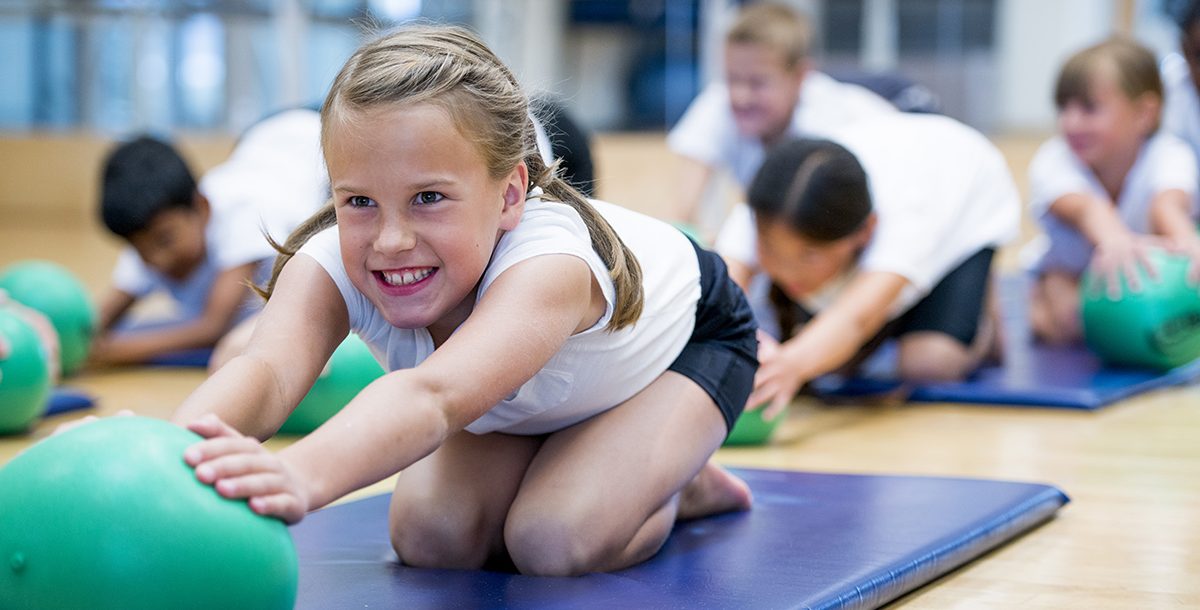Encouraging kids to engage in regular exercise from a young age can provide lifelong benefits, shaping healthier adults. But why is exercise important for kids, and how does it affect both their physical and mental health?
Make an appointment with your child’s pediatrician or family medicine provider to ensure your child is getting enough exercise and is in good health for physical activity.
Why is exercise important for kids?
Exercise plays a vital role in kids’ development and well-being. It’s more than just being about staying fit – it also supports physical, mental and emotional growth. Activity counts as exercise when the heart is beating faster, breathing rate is faster and muscles are being used.
Boosting heart and lung strength
One of the biggest benefits of exercise for kids is the positive impact it has on their heart and lungs. Any activity that gets the heart pumping and the blood flowing strengthens their whole cardiovascular system.
When kids run, swim or ride their bikes, their heart rate increases which allows their heart to become stronger and more efficient over time. This drastically reduces the risk of heart disease in their future.
In addition to the heart, regular physical activity will strengthen their lungs, making them more efficient at transporting oxygen throughout the body. The result is better overall stamina and energy levels for children, making them more active and engaged throughout the day.
Building strong bones and muscles
Exercise plays a big role in developing healthy bones and muscles. When kids jump and run, their bone growth is stimulated, which is especially important for children as their bones are still developing. A strong skeletal system helps prevent injuries and builds a solid foundation for future physical activity.
Managing weight and preventing chronic conditions
In today’s world, childhood obesity is becoming increasingly common, and regular exercise is a key tool in managing a healthy weight. When kids engage in an hour of physical activity daily it’s easier for them to maintain a healthy weight, which in turn reduces their risk of developing conditions like type 2 diabetes and heart disease.
How exercise helps mental health
While there are many physical health benefits associated with physical activity, there are also lots of mental health benefits as well.
Exercise isn’t just good for the body – it’s also good for the mind. Kids who are active tend to have better focus, improved mood and increased cognitive function. Physical activity can enhance academic performance by boosting memory, attention and even problem-solving skills.
PE class: How exercising at school helps
School-age kids between kindergarten and high school should have at least 60 minutes of physical activity every day. Going to regular PE or gym class is a great way for kids to be active in lots of different ways.
Kids that have a chance to be physically active during the day have breaks from periods of quieter study time. This helps kids expend energy, which often helps them focus and concentrate better in the classroom.
Physical health
Regular exercise has also been linked with these emotional responses in children:
- Better behavior and less acting out
- Improved self-esteem
- Improved sleep
- More confidence
- Reduced stress, anxiety and depression
- Stronger thinking skills
Mental health
Additionally, children with certain behavioral diagnoses often behave better and act out less on the days they participate in physical education or some type of exercise. These include:
- Anxiety disorders
- Attention deficit hyperactivity disorder (ADHD)
- Autism
- Mood disorders
Emotional health
Physical education and exercise are important for brain development in kids. Here’s why:
- Exercise helps improve the thinking process and problem-solving skills.
- Kids can remember what they’re taught and perform better on assignments and tests.
- Kids pay attention better in the classroom when they exercise.
- Kids who exercise regularly develop better hand-eye coordination.
Long-term benefits of exercise for kids
The long-term health benefits of exercise for kids cannot be overstated. Starting regular physical activity early in life can pave the way for a healthier future. By the time kids reach 17 years old and beyond, those who have been active are more likely to maintain a healthy weight, enjoy strong bones and muscles and avoid chronic conditions.
When students spend time in PE class during school, they often learn that they like being physically active. This can help kids to start making physical activity a priority in their lives. Maintaining a healthier weight is also linked to positive body image, which is linked to positive self-esteem. All of this is an important part of both physical and mental health.
Kids who spend time together playing active games will often make friends, which can help with any feelings of loneliness and isolation. If a child feels social anxiety in some situations, focusing on a sport or active game can be a great way to reduce those social pressures.
How we can help
Incorporating exercise into a child’s daily routine, whether through organized sports, playing outdoors or simply going on a bike ride, creates habits that last a lifetime. The benefits of exercise for kids are far-reaching, promoting better health now and ensuring a healthy future.
Having conversations with your child’s pediatrician or family medicine provider can help you ensure that your child is getting enough exercise so they see both the short- and long-term benefits. Seeing your child regularly allows their provider to better understand your child’s health and keep them growing strong.
Learn more about the pediatric and family medicine services we offer at Bon Secours.





